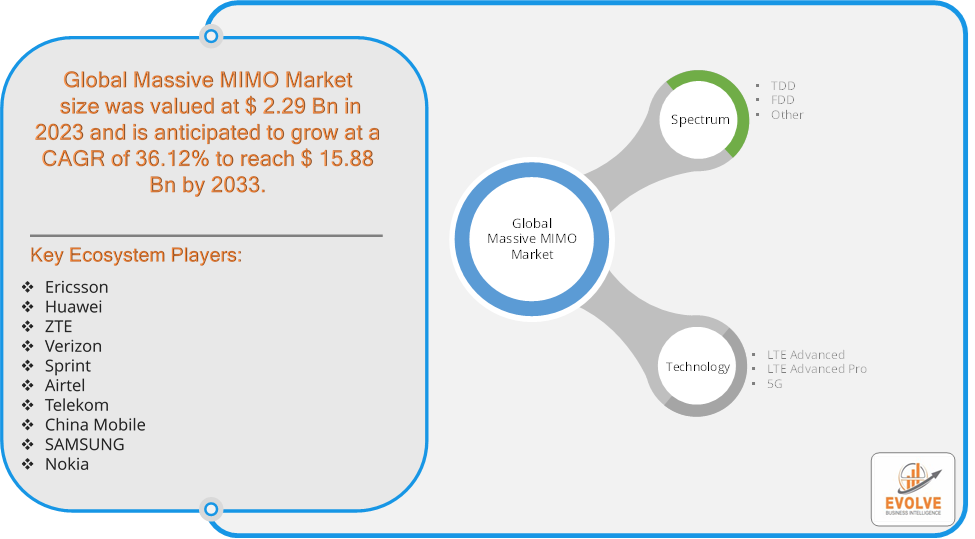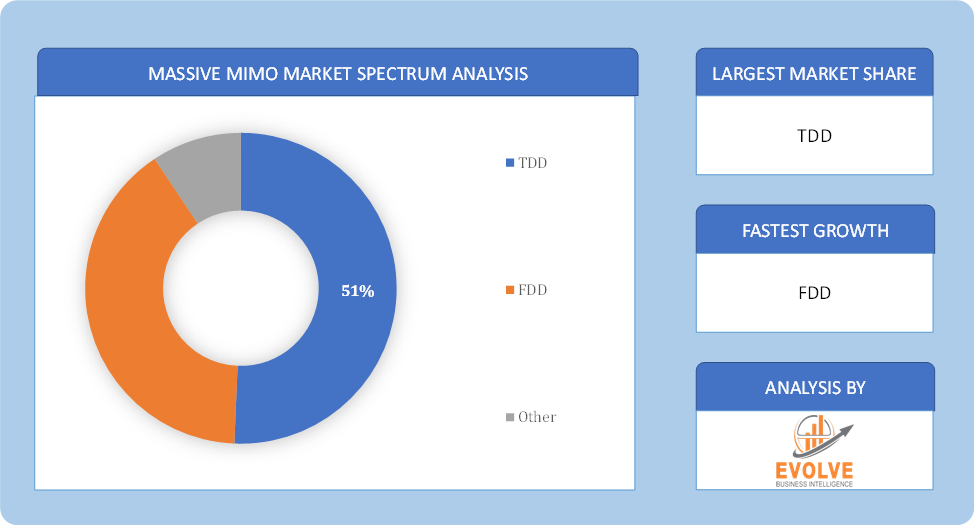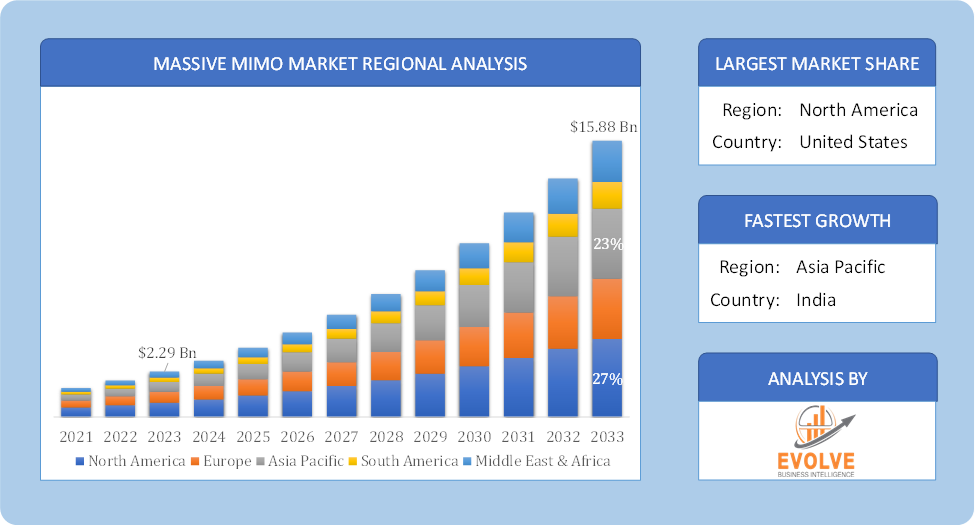Massive MIMO Market Analysis and Global Forecast 2023-2033
$ 1,390.00 – $ 5,520.00Price range: $ 1,390.00 through $ 5,520.00
Massive MIMO Market Research Report: Information By Spectrum (TDD, FDD, Other), By Technology (LTE Advanced, LTE Advanced Pro, 5G), and by Region — Forecast till 2033
Page: 165
Massive MIMO Market Overview
The Massive MIMO Market Size is expected to reach USD 15.88 Billion by 2033. The Massive MIMO Market industry size accounted for USD 2.29 Billion in 2023 and is expected to expand at a compound annual growth rate (CAGR) of 36.12% from 2023 to 2033. The Massive MIMO (Multiple-Input Multiple-Output) is a wireless communication technology that employs a large number of antennas at both the transmitter and receiver ends. This technology significantly enhances the capacity, throughput, and coverage of wireless networks. By using advanced techniques like spatial multiplexing and beamforming, Massive MIMO enables multiple users to simultaneously share the same frequency spectrum, leading to improved network efficiency and user experience.
The Massive MIMO market encompasses the entire ecosystem of technologies, companies, and applications related to the deployment and utilization of Massive MIMO systems, which are crucial for meeting the demands of modern and future wireless communication networks.
Global Massive MIMO Market Synopsis
The COVID-19 pandemic had a significant impact on the Massive MIMO market. With the shift to remote work and online learning, there was a surge in demand for high-speed, reliable internet connections. This heightened need for better network infrastructure accelerated the adoption of advanced technologies like Massive MIMO. The pandemic led to increased data traffic as people used streaming services, video conferencing, and online collaboration tools more frequently. The pandemic underscored the importance of robust connectivity, leading to increased investments in 5G infrastructure, where Massive MIMO plays a critical role. The pandemic prompted accelerated research and development in telecom technologies, including Massive MIMO, to support the growing demand for high-capacity networks. The pandemic caused significant disruptions in global supply chains, affecting the production and delivery of components needed for Massive MIMO systems, such as antennas and base station equipment. Restrictions on movement and labour shortages affected the progress of network infrastructure projects, including those involving Massive MIMO technology.
Massive MIMO Market Dynamics
The major factors that have impacted the growth of Massive MIMO Market are as follows:
Drivers:
Ø Technological Advancements
Advances in antenna design and beamforming techniques have made Massive MIMO more practical and cost-effective. Innovations in signal processing algorithms and machine learning enhance the efficiency and effectiveness of Massive MIMO systems. Massive MIMO is a core technology for 5G networks, providing higher capacity, faster speeds, and lower latency. The rollout of 5G networks globally is a major driver for the adoption of Massive MIMO. Massive MIMO enhances coverage and reliability, which is crucial for the successful deployment and performance of 5G networks. Massive MIMO increases spectral efficiency, allowing more data to be transmitted over the same frequency spectrum, which can lead to cost savings for network operators.
Restraint:
- Perception of High Initial Costs and Technical Complexity
Deploying Massive MIMO systems involves significant capital expenditure on advanced hardware, including antennas and base stations, as well as software for signal processing. The installation and integration of Massive MIMO infrastructure can be costly, especially in existing networks that require extensive modifications. Implementing Massive MIMO involves sophisticated technologies, including complex algorithms for beamforming and signal processing, which require specialized knowledge and expertise.
Opportunity:
⮚ Expansion of 5G Networks
As 5G networks continue to expand globally, Massive MIMO technology is crucial for achieving the high capacity, speed, and low latency required. This expansion presents significant opportunities for companies involved in the development and deployment of Massive MIMO systems. Network operators upgrading from 4G to 5G can leverage Massive MIMO to maximize their investment and improve network performance. Massive MIMO improves spectral efficiency and reduces interference, leading to better network performance with fewer resources. This efficiency can lower operational costs and improve the return on investment for network operators.
Massive MIMO Market Segment Overview
Based on Spectrum, the market is segmented based on TDD, FDD and Other. The TDD segment dominated the market. TDD leads the market share for its high data rates and a large capacity for data and HD voice, it highly improves customer experience and reduces the operator’s cost per bit. It provides spectrum flexibility and can run on multiple spectrum bands up to a bandwidth of 200MHz in a single band. These all factors for Massive MIMO positively impact the market growth.
By Technology
Based on Technology, the market segment has been divided into LTE Advanced, LTE Advanced Pro and 5G. The LTE Advanced segment dominant the market. LTE Advanced technology segment holds the largest market share for its benefits like resolving the bandwidth issues that causes due to the millions of users on a single carrier service.
Global Massive MIMO Market Regional Analysis
Based on region, the global Massive MIMO Market has been divided into North America, Europe, Asia-Pacific, the Middle East & Africa, and Latin America. North America is projected to dominate the use of the Massive MIMO Market followed by the Asia-Pacific and Europe regions.
 Massive MIMO North America Market
Massive MIMO North America Market
North America holds a dominant position in the Massive MIMO Market. North America is a leading region in the adoption of Massive MIMO technology, driven by aggressive 5G deployment and high demand for advanced network infrastructure. Major telecom operators and technology companies are actively investing in and deploying Massive MIMO systems to enhance network performance and capacity. High consumer demand for data, competitive telecom environment, and substantial investments in 5G infrastructure. Government support and favorable regulatory frameworks also contribute to market growth.
Massive MIMO Asia-Pacific Market
The Asia-Pacific region has indeed emerged as the fastest-growing market for the Massive MIMO Market industry. Asia-Pacific is a major growth region for Massive MIMO due to the large-scale rollout of 5G networks and rapid urbanization. China, in particular, has heavily invested in 5G infrastructure and is a leading adopter of Massive MIMO technology. India is also expanding its 5G capabilities, though the pace of adoption is varied. Japan and South Korea both countries are advanced in technology adoption and are actively deploying Massive MIMO as part of their 5G strategies and high population density, rapid technological advancements, and strong government support for 5G.
Competitive Landscape
The global Massive MIMO Market is highly competitive, with numerous players offering a wide range of software solutions. The competitive landscape is characterized by the presence of established companies, as well as emerging startups and niche players. To increase their market position and attract a wide consumer base, the businesses are employing various strategies, such as product launches, and strategic alliances.
Prominent Players:
- Ericsson
- Huawei
- ZTE
- Verizon
- Sprint
- Airtel
- Telekom
- China Mobile
- SAMSUNG
- Nokia
Scope of the Report
Global Massive MIMO Market, by Spectrum
- TDD
- FDD
- Other
Global Massive MIMO Market, by Technology
- LTE Advanced
- LTE Advanced Pro
- 5G
Global Massive MIMO Market, by Region
- North America
- US
- Canada
- Mexico
- Europe
- UK
- Germany
- France
- Italy
- Spain
- Benelux
- Nordic
- Rest of Europe
- Asia Pacific
- China
- Japan
- South Korea
- Indonesia
- Austalia
- Malaysia
- India
- Rest of Asia Pacific
- South America
- Brazil
- Argentina
- Rest of South America
- Middle East & Africa
- Saudi Arabia
- UAE
- Egypt
- South Africa
- Rest of Middle East & Africa
| Parameters | Indicators |
|---|---|
| Market Size | 2033: USD 15.88 Billion |
| CAGR (2023-2033) | 36.12% |
| Base year | 2022 |
| Forecast Period | 2023-2033 |
| Historical Data | 2021 (2017 to 2020 On Demand) |
| Report Coverage | Revenue Forecast, Competitive Landscape, Growth Factors, and Trends |
| Key Segmentations | Spectrum, Technology |
| Geographies Covered | North America, Europe, Asia-Pacific, South America, Middle East, Africa |
| Key Vendors | Ericsson, Huawei, ZTE, Verizon, Sprint, Airtel, Telekom, China Mobile, SAMSUNG and Nokia. |
| Key Market Opportunities | · Expansion of 5G Networks · Cost Reduction and Efficiency Gains |
| Key Market Drivers | · Technological Advancements · 5G Deployment |
REPORT CONTENT BRIEF:
- High-level analysis of the current and future Massive MIMO Market trends and opportunities
- Detailed analysis of current market drivers, restraining factors, and opportunities in the future
- Massive MIMO Market historical market size for the year 2021, and forecast from 2023 to 2033
- Massive MIMO Market share analysis at each product level
- Competitor analysis with detailed insight into its product segment, Government & Defense strength, and strategies adopted.
- Identifies key strategies adopted including product launches and developments, mergers and acquisitions, joint ventures, collaborations, and partnerships as well as funding taken and investment done, among others.
- To identify and understand the various factors involved in the global Massive MIMO Market affected by the pandemic
- To provide a detailed insight into the major companies operating in the market. The profiling will include the Government & Defense health of the company’s past 2-3 years with segmental and regional revenue breakup, product offering, recent developments, SWOT analysis, and key strategies.
Frequently Asked Questions (FAQ)
What is the study period of this market?
The study period of the global Massive MIMO Market is 2021- 2033
What is the growth rate of the global Massive MIMO Market?
The global Massive MIMO Market is growing at a CAGR of 36.12% over the next 10 years
Which region has the highest growth rate in the market of Massive MIMO Market?
Asia Pacific is expected to register the highest CAGR during 2023-2033
Which region has the largest share of the global Massive MIMO Market?
North America holds the largest share in 2022
Who are the key players in the global Massive MIMO Market?
Ericsson, Huawei, ZTE, Verizon, Sprint, Airtel, Telekom, China Mobile, SAMSUNG and Nokia are the major companies operating in the market.
Do you offer Post Sale Support?
Yes, we offer 16 hours of analyst support to solve the queries
Do you sell particular sections of a report?
Yes, we provide regional as well as country-level reports. Other than this we also provide a sectional report. Please get in contact with our sales representatives.
Press Release

Global Pharmaceutical Manufacturing Market to Reach $1.38 Trillion by 2035 with 7.35% CAGR, New Research Shows

The Global Mammography Market Is Estimated To Record a CAGR of Around 10.29% During The Forecast Period

Glue Stick Market to Reach USD 2.35 Billion by 2034

Podiatry Service Market to Reach USD 11.88 Billion by 2034

Microfluidics Technology Market to Reach USD 32.58 Billion by 2034

Ferric Chloride Market to Reach USD 10.65 Billion by 2034

Family Practice EMR Software Market to Reach USD 21.52 Billion by 2034

Electric Hairbrush Market to Reach USD 15.95 Billion by 2034

Daily Bamboo Products Market to Reach USD 143.52 Billion by 2034

Cross-border E-commerce Logistics Market to Reach USD 112.65 Billion by 2034
Table of Content
Chapter 1. Executive Summary Chapter 2. Scope Of The Study 2.1. Market Definition 2.2. Scope Of The Study 2.2.1. Objectives of Report 2.2.2. Limitations 2.3. Market Structure Chapter 3. Evolve BI Methodology Chapter 4. Market Insights and Trends 4.1. Supply/ Value Chain Analysis 4.1.1. Raw End Users Providers 4.1.2. Manufacturing Process 4.1.3. Distributors/Retailers 4.1.4. End-Use Industry 4.2. Porter’s Five Forces Analysis 4.2.1. Threat Of New Entrants 4.2.2. Bargaining Power Of Buyers 4.2.3. Bargaining Power Of Suppliers 4.2.4. Threat Of Substitutes 4.2.5. Industry Rivalry 4.3. Impact Of COVID-19 on the Massive MIMO Market 4.3.1. Impact on Market Size 4.3.2. End-Use Industry Trend, Preferences, and Budget Impact 4.3.3. Regulatory Framework/Government Policies 4.3.4. Key Players' Strategy to Tackle Negative Impact 4.3.5. Opportunity Window 4.4. Technology Overview 12.28. Macro factor 4.6. Micro Factor 4.7. Demand Supply Gap Analysis of the Massive MIMO Market 4.8. Import Analysis of the Massive MIMO Market 4.9. Export Analysis of the Massive MIMO Market Chapter 5. Market Dynamics 5.1. Introduction 5.2. DROC Analysis 5.2.1. Drivers 5.2.2. Restraints 5.2.3. Opportunities 5.2.4. Challenges 5.3. Patent Analysis 5.4. Industry Roadmap 5.5. Parent/Peer Market Analysis Chapter 6. Global Massive MIMO Market, By Spectrum 6.1. Introduction 6.2. TDD 6.3. FDD 6.4. Other Chapter 7. Global Massive MIMO Market, By Technology 7.1. Introduction 7.2. LTE Advanced 7.3. LTE Advanced Pro 7.4. 5G Chapter 8. Global Massive MIMO Market, By Region 8.1. Introduction 8.2. North America 8.2.1. Introduction 8.2.2. Driving Factors, Opportunity Analyzed, and Key Trends 8.2.3. Market Size and Forecast, By Country, 2023-2033 8.2.4. Market Size and Forecast, By Product Type, 2023-2033 8.2.5. Market Size and Forecast, By End User, 2023-2033 8.2.6. US 8.2.6.1. Introduction 8.2.6.2. Driving Factors, Opportunity Analyzed, and Key Trends 8.2.6.3. Market Size and Forecast, By Product Type, 2023-2033 8.2.6.4. Market Size and Forecast, By End User, 2023-2033 8.2.7. Canada 8.2.7.1. Introduction 8.2.7.2. Driving Factors, Opportunity Analyzed, and Key Trends 8.2.7.4. Market Size and Forecast, By Product Type, 2023-2033 8.2.7.5. Market Size and Forecast, By End User, 2023-2033 8.3. Europe 8.3.1. Introduction 8.3.2. Driving Factors, Opportunity Analyzed, and Key Trends 8.3.3. Market Size and Forecast, By Country, 2023-2033 8.3.4. Market Size and Forecast, By Product Type, 2023-2033 8.3.5. Market Size and Forecast, By End User, 2023-2033 8.3.6. Germany 8.3.6.1. Introduction 8.3.6.2. Driving Factors, Opportunity Analyzed, and Key Trends 8.3.6.3. Market Size and Forecast, By Product Type, 2023-2033 8.3.6.4. Market Size and Forecast, By End User, 2023-2033 8.3.7. France 8.3.7.1. Introduction 8.3.7.2. Driving Factors, Opportunity Analyzed, and Key Trends 8.3.7.3. Market Size and Forecast, By Product Type, 2023-2033 8.3.7.4. Market Size and Forecast, By End User, 2023-2033 8.3.8. UK 8.3.8.1. Introduction 8.3.8.2. Driving Factors, Opportunity Analyzed, and Key Trends 8.3.8.3. Market Size and Forecast, By Product Type, 2023-2033 8.3.8.4. Market Size and Forecast, By End User, 2023-2033 8.3.9. Italy 8.3.9.1. Introduction 8.3.9.2. Driving Factors, Opportunity Analyzed, and Key Trends 8.3.9.3. Market Size and Forecast, By Product Type, 2023-2033 8.3.9.4. Market Size and Forecast, By End User, 2023-2033 8.3.11. Rest Of Europe 8.3.11.1. Introduction 8.3.11.2. Driving Factors, Opportunity Analyzed, and Key Trends 8.3.11.3. Market Size and Forecast, By Product Type, 2023-2033 8.3.11.4. Market Size and Forecast, By End User, 2023-2033 8.4. Asia-Pacific 8.4.1. Introduction 8.4.2. Driving Factors, Opportunity Analyzed, and Key Trends 8.4.3. Market Size and Forecast, By Country, 2023-2033 8.4.4. Market Size and Forecast, By Product Type, 2023-2033 8.12.28. Market Size and Forecast, By End User, 2023-2033 8.4.6. China 8.4.6.1. Introduction 8.4.6.2. Driving Factors, Opportunity Analyzed, and Key Trends 8.4.6.3. Market Size and Forecast, By Product Type, 2023-2033 8.4.6.4. Market Size and Forecast, By End User, 2023-2033 8.4.7. India 8.4.7.1. Introduction 8.4.7.2. Driving Factors, Opportunity Analyzed, and Key Trends 8.4.7.3. Market Size and Forecast, By Product Type, 2023-2033 8.4.7.4. Market Size and Forecast, By End User, 2023-2033 8.4.8. Japan 8.4.8.1. Introduction 8.4.8.2. Driving Factors, Opportunity Analyzed, and Key Trends 8.4.8.3. Market Size and Forecast, By Product Type, 2023-2033 8.4.8.4. Market Size and Forecast, By End User, 2023-2033 8.4.9. South Korea 8.4.9.1. Introduction 8.4.9.2. Driving Factors, Opportunity Analyzed, and Key Trends 8.4.9.3. Market Size and Forecast, By Product Type, 2023-2033 8.4.9.4. Market Size and Forecast, By End User, 2023-2033 8.4.10. Rest Of Asia-Pacific 8.4.10.1. Introduction 8.4.10.2. Driving Factors, Opportunity Analyzed, and Key Trends 8.4.10.3. Market Size and Forecast, By Product Type, 2023-2033 8.4.10.4. Market Size and Forecast, By End User, 2023-2033 8.5. Rest Of The World (RoW) 8.5.1. Introduction 8.5.2. Driving Factors, Opportunity Analyzed, and Key Trends 8.5.3. Market Size and Forecast, By Product Type, 2023-2033 8.5.4. Market Size and Forecast, By End User, 2023-2033 Chapter 9. Company Landscape 9.1. Introduction 9.2. Vendor Share Analysis 9.3. Key Development Analysis 9.4. Competitor Dashboard Chapter 10. Company Profiles 10.1. Ericsson 10.1.1. Business Overview 10.1.2. Government & Defense Analysis 10.1.2.1. Government & Defense – Existing/Funding 10.1.3. Product Portfolio 10.1.4. Recent Development and Strategies Adopted 10.1.5. SWOT Analysis 10.2. Huawei 10.2.1. Business Overview 10.2.2. Government & Defense Analysis 10.2.2.1. Government & Defense – Existing/Funding 10.2.3. Product Portfolio 10.2.4. Recent Development and Strategies Adopted 10.2.5. SWOT Analysis 10.3. ZTE 10.3.1. Business Overview 10.3.2. Government & Defense Analysis 10.3.2.1. Government & Defense – Existing/Funding 10.3.3. Product Portfolio 10.3.4. Recent Development and Strategies Adopted 10.3.5. SWOT Analysis 10.4. Verizon 10.4.1. Business Overview 10.4.2. Government & Defense Analysis 10.4.2.1. Government & Defense – Existing/Funding 10.4.3. Product Portfolio 10.4.4. Recent Development and Strategies Adopted 10.12.28. SWOT Analysis 10.5. Sprint 10.5.1. Business Overview 10.5.2. Government & Defense Analysis 10.5.2.1. Government & Defense – Existing/Funding 10.5.3. Product Portfolio 10.5.4. Recent Development and Strategies Adopted 10.5.5. SWOT Analysis 10.6. Airtel 10.6.1. Business Overview 10.6.2. Government & Defense Analysis 10.6.2.1. Government & Defense – Existing/Funding 10.6.3. Product Portfolio 10.6.4. Recent Development and Strategies Adopted 10.6.5. SWOT Analysis 10.7. Telekom 10.7.1. Business Overview 10.7.2. Government & Defense Analysis 10.7.2.1. Government & Defense – Existing/Funding 10.7.3. Product Portfolio 10.7.4. Recent Development and Strategies Adopted 10.7.5. SWOT Analysis 10.8 China Mobile 10.8.1. Business Overview 10.8.2. Government & Defense Analysis 10.8.2.1. Government & Defense – Existing/Funding 10.8.3. Product Portfolio 10.8.4. Recent Development and Strategies Adopted 10.8.5. SWOT Analysis 10.9 SAMSUNG 10.9.1. Business Overview 10.9.2. Government & Defense Analysis 10.9.2.1. Government & Defense – Existing/Funding 10.9.3. Product Portfolio 10.9.4. Recent Development and Strategies Adopted 10.9.5. SWOT Analysis 10.10. Nokia 10.10.1. Business Overview 10.10.2. Government & Defense Analysis 10.10.2.1. Government & Defense – Existing/Funding 10.10.3. Product Portfolio 10.10.4. Recent Development and Strategies Adopted 10.10.5. SWOT Analysis
Connect to Analyst
Research Methodology









